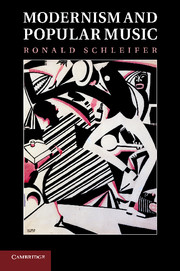Book contents
- Frontmatter
- Contents
- List of Figures
- Preface
- Acknowledgments
- Introduction: popular music and the experience of modernism
- PART I MUSICAL MODERNISM: POPULAR MUSIC IN THE TIME OF JAZZ
- PART II GERSHWIN, PORTER, WALLER, AND HOLIDAY
- 3 Melting pot and meeting place: the Gershwin brothers and the arts of quotation
- 4 “What is this thing called love?”: Cole Porter and the rhythms of desire
- 5 Signifying music: Fats Waller and the time of jazz
- 6 Music without composition: Billie Holiday and ensemble performance
- Conclusion: popular music and the revolution of the word
- Notes
- Bibliography
- Index
6 - Music without composition: Billie Holiday and ensemble performance
Published online by Cambridge University Press: 05 July 2011
- Frontmatter
- Contents
- List of Figures
- Preface
- Acknowledgments
- Introduction: popular music and the experience of modernism
- PART I MUSICAL MODERNISM: POPULAR MUSIC IN THE TIME OF JAZZ
- PART II GERSHWIN, PORTER, WALLER, AND HOLIDAY
- 3 Melting pot and meeting place: the Gershwin brothers and the arts of quotation
- 4 “What is this thing called love?”: Cole Porter and the rhythms of desire
- 5 Signifying music: Fats Waller and the time of jazz
- 6 Music without composition: Billie Holiday and ensemble performance
- Conclusion: popular music and the revolution of the word
- Notes
- Bibliography
- Index
Summary
I don't think I'm singing. I feel like I am playing a horn. I try to improvise like Les Young, like Louis Armstrong, or someone else I admire.
Billie HolidayIn the preceding chapters, I have discussed the popular music of the Gershwins, of Cole Porter, of Fats Waller. In doing this, I have focused on the relationships among music, language, and culture – and, particularly, on social, psychological, and linguistic aspects of the modernist culture of America between the two world wars. George and Ira Gershwin's parents were recent immigrants to America when Ira (Isadore) was born in December 1896 (the family was living on the lower east side of Manhattan) and George (Jakob) in September 1898 (the family was living in Brooklyn); the Gershwins lived a secularized life in America, and they were never poor. Cole Porter was born in Peru, Indiana, to a wealthy family in 1891; he attended Yale and served in World War I. Thomas Waller was born on 134th Street in New York in 1904, in the heart of Harlem, of parents who had married in Virginia and moved to New York to raise their family; Waller's father, Edward Martin Waller, worked in a stable and, before Waller's birth, became a deacon in the Abyssinian Baptist Church, where his wife Adeline – Waller's mother – sang in the choir and played the piano and organ for services.
- Type
- Chapter
- Information
- Modernism and Popular Music , pp. 155 - 175Publisher: Cambridge University PressPrint publication year: 2011



